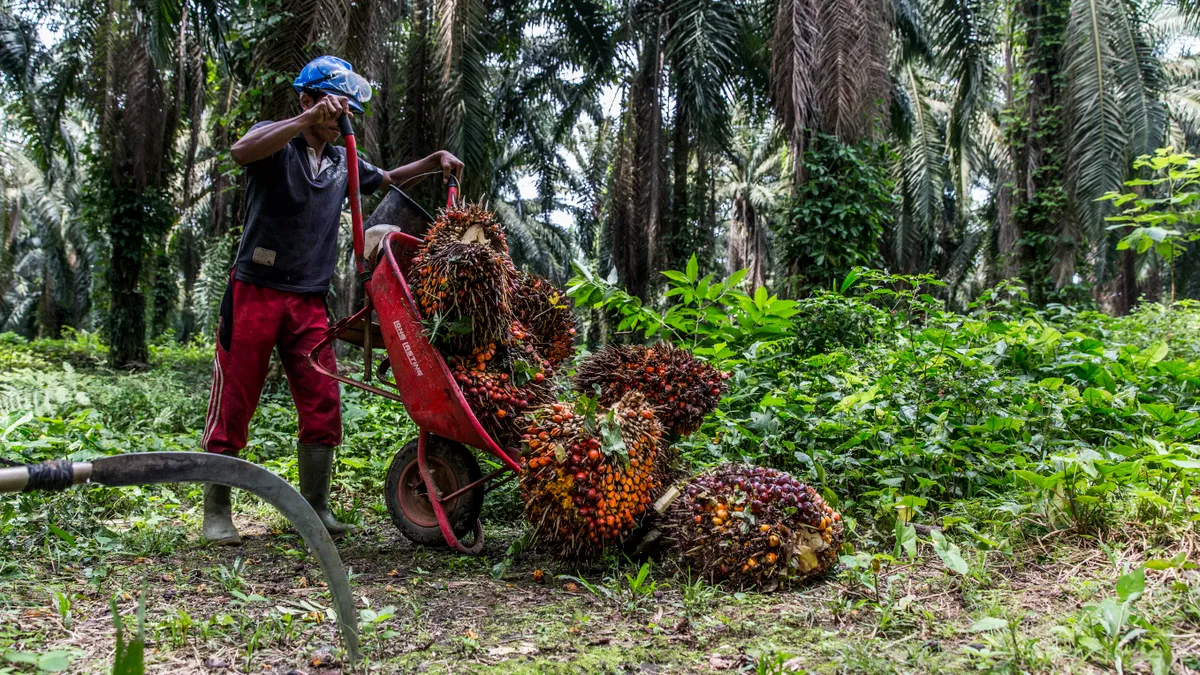Dive Brief:
- Nestlé and Procter & Gamble will not meet 10-year-old goals to rid their supply chains of deforestation by 2020, Reuters reported citing spokespeople from each company.
- Nestlé's palm oil supply chain is reportedly 90% free of deforestation, up from 77% earlier this year, according to the company. P&G has not released a progress figure.
- Palm oil-concerned environmental groups and even some food companies have warned corporations would struggle to meet 2020 deforestation goals, due to difficulties in bringing transparency to palm oil supply chains.
Dive Insight:
The danger in making public sustainability goals is that missing them becomes public too. Mondelez, Mars, Unilever and many other major procurers of palm oil have set no formal deforestation reduction goals, though each has some deforestation reduction work embedded in its procurement strategies. A July report from CDP said 38% of purchasing organizations and 77% of suppliers lack deforestation commitments.
In that way, failure in the case of Nestlé and Procter & Gamble is a small transparency success, even though the facts are not what the companies nor the environmental community hoped to see.
For years, certification was seen as the silver bullet in ridding the palm oil supply chain of deforestation, but experts from inside and outside of the companies purchasing it are realizing certification alone is not enough to stem global deforestation. A more immersive, personal way of working with palm oil-producing areas, involving local authorities and understanding on-the-ground dynamics is emerging as the way forward, though the heavy-lift in terms of expertise, time and labor investment is a barrier.
Cargill's CEO wrote in an op-ed published in June on the Tropical Forest Alliance (TFA) 2020 website that said beef, soy, cocoa and palm oil supply chains will likely miss 2020 goals. "That is hard for me to admit — but it is not a reason to stop taking critical action," Dave MacLennan wrote, calling for more collaboration among stakeholders.
Cargill is one of 200 signatories to The New York Declaration on Forests (NYDF) — a pledge to halve global deforestation by 2020 and end it by 2030 — signed by governments, companies, indigenous peoples and civil society organizations at the United Nations Climate Summit in 2014. A Sept. 12 report on progress five years into the commitment reads "there is little evidence that these goals are on track, and achieving the 2020 NYDF targets is likely impossible." TFA reported in June 2018 corporate commitments to ending deforestation are slowing down due to the approaching 2020 deadline, leading to some doubt about continued progress in the next year or two.
Meanwhile, a 2019 investigation by the Rainforest Action Network released today found palm oil purchased by Unilever, Nestlé, PepsiCo, Mondelez, General Mills, Kellogg’s, Mars and Hershey is being grown illegally inside the nationally protected Rawa Singkil Wildlife Reserve in Indonesia.
"Despite the fact that these big name brands publicly promised to end deforestation for snack foods years ago, they are still sourcing from the companies driving palm oil plantation expansion into the heart of one of the highest priority conservation landscapes for addressing the climate crisis and wildlife extinction on the planet: the lowland peat forests of the Leuser Ecosystem," Gemma Tillack, forest policy director for Rainforest Action Network, said in a statement.
The investigation shows companies with the intention to end deforestation must demand visibility through the tiers and verify the information they get from mills and other suppliers.
"The mills investigated here simply do not have the basic systems in place to ensure their palm oil is not driving rainforest destruction," Tillack said, "so no company with a no-deforestation commitment can buy from them in good faith to their existing policy."














